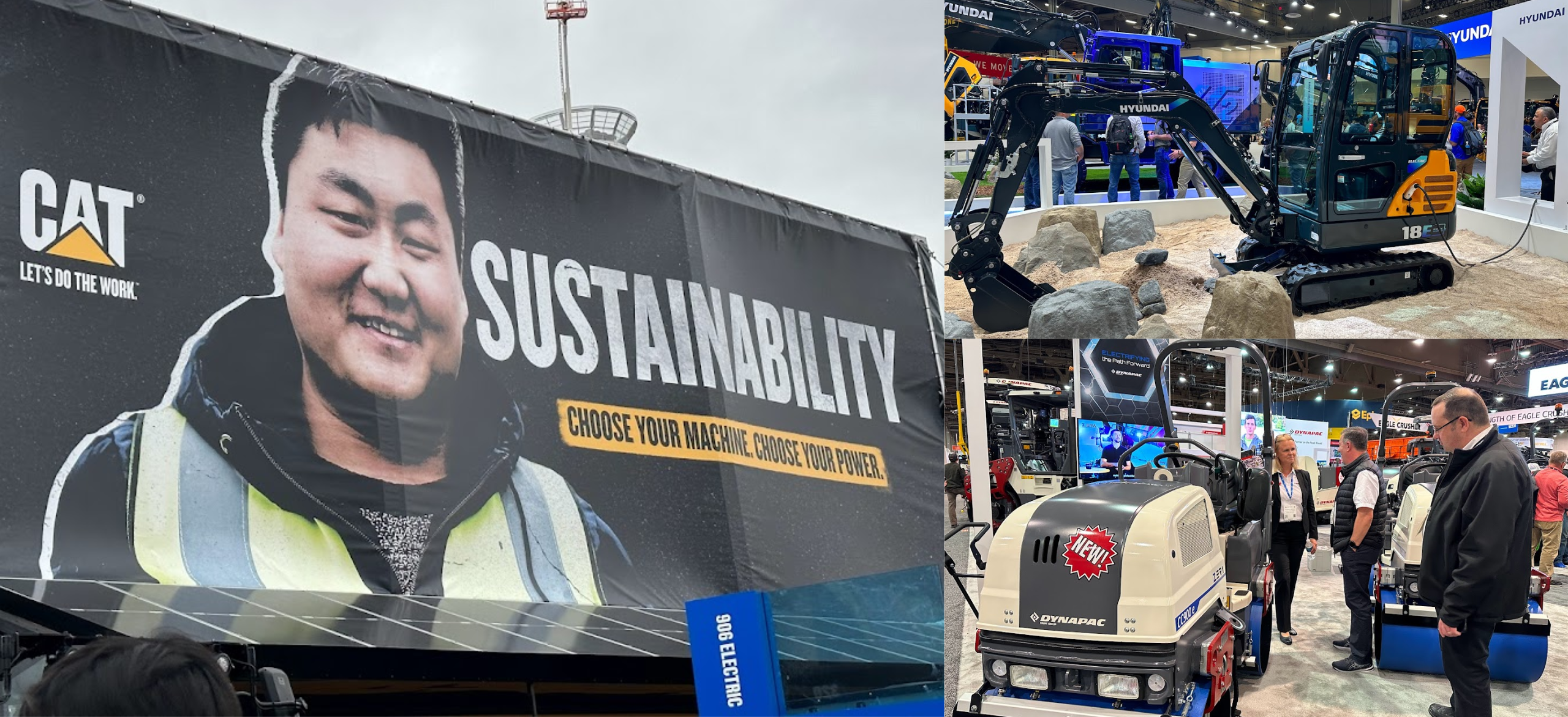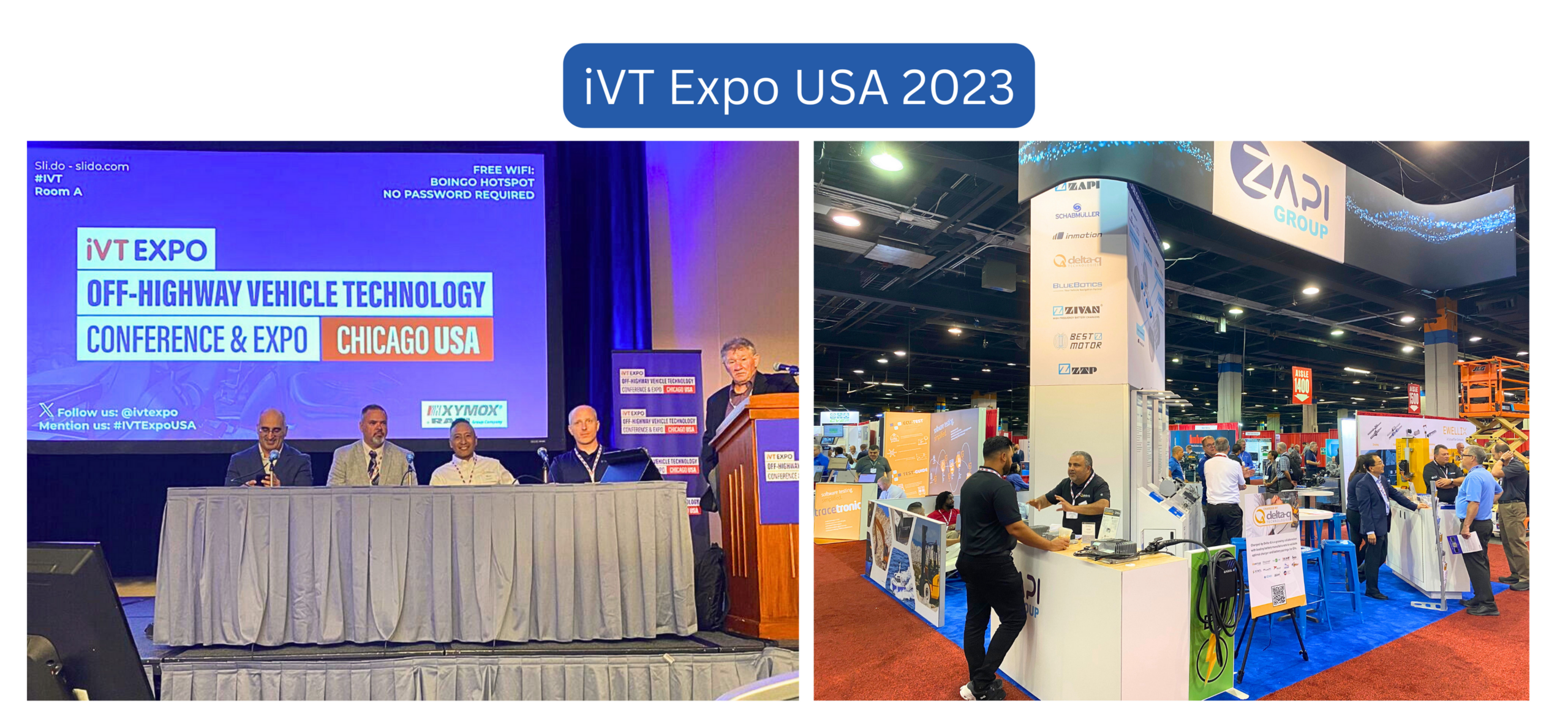CONEXPO-CON/AGG is a renowned trade show in the construction industry and is recognized as the largest in North America. Held every three years, this event recently took place in Las Vegas, Nevada, from March 14-18, 2023. This event brought together an array of professionals in the construction industry, from contractors and dealers to distributors and engineers. Delta-Q Technologies was thrilled to exhibit at the year’s event as part of the ZAPI GROUP booth and showcase its cutting-edge battery charging solutions for the construction industry.
Key Trends from CONEXPO-CON/AGG 2023
The atmosphere was electric at CONEXPO-CON/AGG, brimming with innovation and industry camaraderie, as attendees eagerly explored the latest advancements shaping the future of construction in North America. Through engaging discussions with construction equipment exhibitors, we uncovered intriguing trends, including the ongoing debate between electrification and diesel, the growing adoption of electric-drive equipment and its drivers and the rise of alternative clean fuel sources, such as hydrogen fuel cells.
Debate Between Diesel Machinery vs. Electrification in Construction Equipment
While there has been a remarkable increase in electric and hybrid machinery on display compared to three years ago, many still anticipate continued demand for diesel machinery in North America. Advocates of diesel machinery argue it’s one of the only solutions currently suitable for higher-powered/heavier construction equipment. The primary reasons are:
- These machines have long duty cycles, and current battery and charging technology cannot meet the 12-hour runtime and fast-charging needs.
- Implementing battery-swapping technology would not be viable for machines with higher battery capacities, as these batteries are heavier, and swapping would be difficult.
- Current charging infrastructure cannot support the power requirements for heavy machinery in rural areas like mines. Doing so would be very expensive.
- Current regulations in North America do not mandate the transition of most heavy machinery to electric power, but they do not disregard the possibility that this could change.
On the contrary, supporters of electric power believe the transition is imminent and will affect all types of machinery, both small and large. This debate is driven by several factors: increased stringent emissions regulations, aggressive sustainability targets original equipment manufacturers (OEMs) have set to reduce carbon emissions, and a growing push from customers. Customers are concerned about noise pollution and health issues associated with operating diesel-powered construction equipment indoors and in residential areas.
Strict Regulations Propelling Electrification
While Europe has been at the forefront of enacting strict regulations on gas- or diesel-powered construction equipment, many states in the United States are following suit. In California, for instance, the California Air Resources Board recently approved a new regulation requiring all small off-road engines to achieve “zero emissions” during operation. The new standard will take effect in 2024 and prohibits the sale of any new equipment under 25 hp (or 19 kW) that does not meet this requirement. As a result, many manufacturers are accelerating their efforts to offer electric products that comply with the new regulation. Many OEMs at CONEXPO referred to this regulation as a driving factor toward the shift to electric power. Companies, like SANY, had posters educating visitors on this regulation with information on key dates of which machines need to be electrified, when and where electrification makes sense today and the evolution of battery technology.
While diesel machines seem to remain the primary sellers in many regions, the industry is exploring various options to reduce emissions and meet these regulations, including alternative clean fuels and hybrid technology. However, we’ll have to wait and see how these solutions will be adopted and implemented in the coming years.
Sustainability Goals to Curb Carbon Emissions
While discussions at the show largely centered around the move towards electric solutions due to regulations, another driving factor was sustainability.
Many OEMs prominently displayed banners about their commitment to becoming carbon-neutral by 2040 or 2050. They also had dedicated spaces to showcase their full line of electric-powered machinery. This marked a significant change from just a few years ago when fewer companies offered such products, and many OEMs viewed electrification as a distant possibility and were hesitant to invest in it.
Some companies even outlined the technologies they’re adopting to meet their sustainability goals beyond just using electric power. This included hybrid solutions and hydrogen-fuel cells. Volvo Construction Equipment, for instance, showcased its new line of electric construction equipment and other autonomous concepts that will help push the industry toward a more sustainable future. This included zero-emission electric machines, mobile charging solutions for their electric equipment used in job sites or rural areas, the world’s first hydrogen fuel cell articulated hauler, and more.
We also learned that retail giants like Walmart and Costco have set ambitious sustainability goals, driving the demand for zero-emission machinery. Additionally, customers are demanding emission-free machines for use indoors.
Digitization of Electric Equipment
Another noteworthy trend we observed at the expo was the growing collaboration between software companies and equipment manufacturers, driven by the increasing digitization of electric equipment. This digitization enables data collection and analysis, crucial for informed decision-making in the electrification process. As a result, software companies and equipment manufacturers are partnering to integrate their products and services, providing customers with easier access to advanced digital solutions. This collaborative effort is paving the way for innovative technologies that will continue to shape the construction industry’s future.
Increased Demand for Alternative Clean Fuels
With a shared commitment to combat climate change, alternative fuels, such as hydrogen fuel cells, emerged as a potential game-changer at CONEXPO.
Hydrogen fuel cell technology has the capability to help decarbonize heavy construction and mining machinery and meet the longer runtime demands currently unmet by electric machinery. However, challenges persist for the widespread adoption of this technology, including the high initial costs of the technology and the inadequate infrastructure for hydrogen fueling stations. Interestingly, some suggested electrification is important, as it is a crucial stepping stone towards transitioning fully to hydrogen fuel cells.
While we anticipate seeing more hydrogen fuel cell-powered equipment in the future, it will unlikely be a widespread solution for the industry soon. Despite the challenges, there is ongoing research and development in the field, with several companies exploring using hydrogen fuel cells in construction equipment. As the technology advances and becomes more affordable and accessible, it may become another viable option for the industry and avenue to achieve carbon neutrality.
Delta-Q Around the Show
We were thrilled to see our Delta-Q chargers showcased prominently alongside electric construction equipment from leading OEMs at CONEXPO.
- German manufacturer Wacker Neuson featured two products on display with Delta-Q’s IC650 and RQ350 chargers: their battery-operated vibratory plate, which is charged by the IC650 battery charger, and their compact excavator, which the RQ350 charges.
- Toro showcased an electric buggy and mini skid steer, both equipped with our RC1200 battery charger.
- Sinoboom exhibited an electric scissor lift equipped with our IC650 battery charger.
- Skyjack displayed several electric scissor lifts equipped with our IC650 battery charger.
- BOMAG featured their tamping machine with an off-board RQ350 charger on display.
- Dynapac showcased an off-board ICL1500 charger for their electric-driven asphalt roller.
We look forward to continuing to work with these companies and others in the industry to provide cutting-edge charging solutions that will accelerate the adoption of sustainable and efficient electric compact construction equipment.
The Future is Certainly Electric in the Construction Equipment Industry
This year’s CONEXPO-CON/AGG did not disappoint! Overall, the 2023 event highlighted a substantial increase in electric and hybrid construction equipment compared to 2020, indicating a notable shift in the market’s mindset.
Although California’s emissions regulation has influenced OEMs to consider electrifying their machinery and exploring other carbon-neutral technologies, opinions on the future of electric equipment vary. Nonetheless, the shift towards electric drive is encouraging and is gaining traction among all OEMs. And despite continuing debates surrounding diesel, we predict electric machinery will dominate the equipment floor in 2026!





